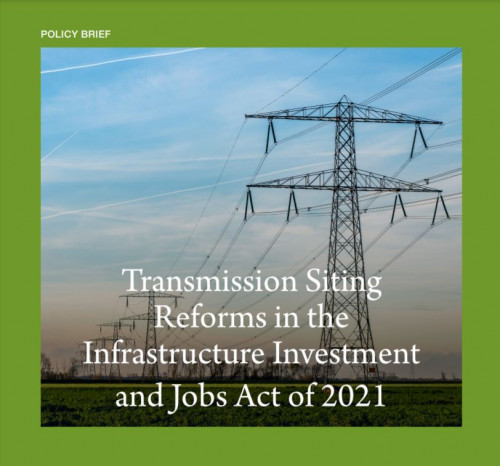-
Amicus Brief on New Jersey’s Zero-Emissions Credits Program
In 2018, New Jersey established a Zero-Emissions Credits (ZECs) program, which provides subsidies to the state’s nuclear power plants for reducing carbon emissions in the energy sector. Our amicus brief explains how the Social Cost of Carbon is the best available estimate for valuing harms caused by carbon dioxide emissions. We also argue that the ZECs program should account for the benefits of avoided emissions both inside and outside of New Jersey.
-
Joint Comments to DOE on Energy Efficiency Standard for Lightbulbs
Together with partner groups, we submitted joint comments to the Department of Energy (DOE) on it proposed energy efficiency standard for general service lamps (i.e. lightbulbs). Our comments applaud DOE for using the social cost of greenhouse gases (SC-GHGs) in analyzing the proposed rule, but encourage the agency to expand upon its rationale for adopting a global damages valuation and for the range of discount rates it applies to climate effects. We further recommend that DOE disclose the SC-GHG estimates that it applies after 2050.
-
Transmission Siting Reforms in the Infrastructure Investment and Jobs Act of 2021
This policy brief highlights Infrastructure Investment and Jobs Act (IIJA) provisions that are relevant to transmission siting, summarizes the changes they effectuate, and describes important implications of those changes for efforts to develop more interstate transmission capacity. It then offers a brief assessment of the IIJA’s overarching significance to such efforts, including by comparing them to a more ambitious legislative alternative.
-
Comments to FERC on Transmission ANOPR
Our comments recommend that FERC make significant changes to enhance the transmission planning and cost allocation processes -- changes that address barriers to development of regional and interregional transmission that would interconnect and integrate far-flung but low-cost renewable resources. We argue for using a nationally uniform, forward-looking cost-benefit analysis to guide project selection and encourage the Commission to consider prescribing cost allocations that distribute the costs associated with societal benefits and public goods as broadly as possible.
In reply comments to comments submitted by other parties, we clarify that FERC has authority to define the benefits of transmission capacity and to guide the allocation of transmission project costs among beneficiaries.
-
Comments to Colorado PUC on Joining an RTO
Policy Integrity signed on to comments filed with the Colorado Public Utilities Commission (PUC) by Western Resource Advocates and the Western Grid Group. These comments sum up the key arguments presented in the long-running docket in which the PUC has considered questions about participation in a competitive wholesale market. The comments organize the points made in support of Colorado opting to join a new western Regional Transmission Organization (likely an expanded version of California's ISO+EIM) instead of joining SPP to the east or establishing its own Colorado-only RTO.
-
Comments to DOE on Conservation Standards for Furnaces and Water Heaters
In August 2021, DOE proposed to return to holding less-efficient gas furnaces to the same standard as other gas furnaces. We filed comments supporting the proposal, while cautioning DOE against making unnecessary statements that might hinder its ability in the future to set standards that would encourage consumers to switch from gas-fired appliances to electric appliances.
-
Shaping Virginia’s Energy Storage
Virginia recently adopted aggressive decarbonization legislation, which recognized that energy storage has an important role to play in decarbonizing the power sector. The Virginia Energy Storage Task Force (VESTF) was convened to help guide the deployment of energy storage resources. Senior Attorney Justin Gundlach served on the task force, and VESTF's final report drew extensively on Policy Integrity's research, including its reports on energy storage policy, valuing DERs, and DERs' emissions reduction potential.
-
Comments to FERC on Climate Risks, Reliability, and Resilience
The Federal Energy Regulatory Commission requested responses to a number of questions on the effects of climate change and electric system reliability. In April 2021, we submitted comments highlighting opportunities to improve reliability and resilience by adjusting approaches the Commission and others take to planning, investing in, and operating grid components.
Then FERC, following a technical conference over the summer, requested further comments on a specific series of questions. In September 2021, we submitted joint comments describing process options and resources for conducting climate resilience planning, and emphasized how accounting for climate impacts is relevant to consumer costs.
-
Comments to Michigan PSC on Extreme Weather Planning
In the aftermath of summer storms that resulted in widespread and prolonged power outages, Michigan's Public Service Commission requested comments on whether utilities should continue to rely exclusively on historical data when planning for extreme events. In comments filed jointly with the Sabin Center for Climate Change Law at Columbia Law School, and the Initiative for Climate Risk and Resilience Law, Policy Integrity suggested processes and tools that the Commission should direct utilities to use to identify and mitigate vulnerabilities to the impacts of extreme weather and climate change impacts more generally.
-
Comments to FERC on Joint Federal-State Task Force on Transmission
We submitted comments to FERC today providing suggested topics for the first meeting of the joint federal-state task force on transmission. Our comments respond to a request for topics related to barriers inhibiting more efficient and effective transmission planning and deployment. We identify two barriers that the task force should discuss -- jurisdictional issues related to transmission siting and the lack of a standardized cost benefit analysis rubric for transmission projects.
Viewing recent projects in Electricity







